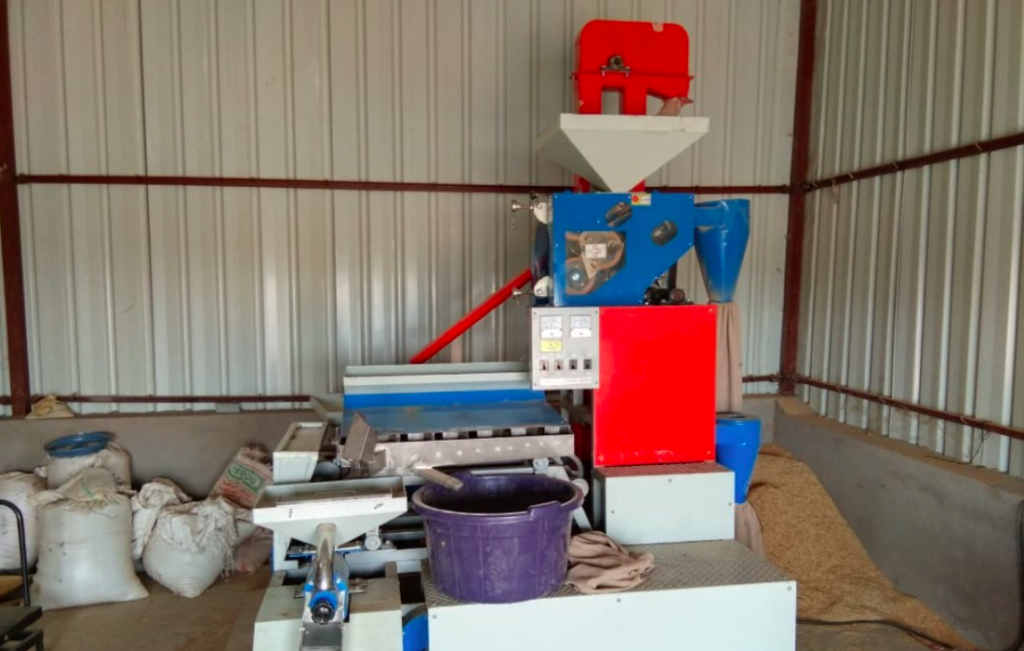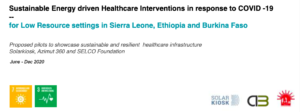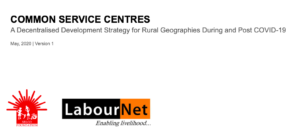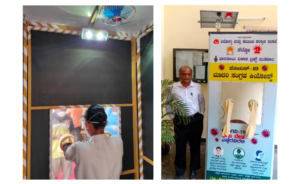Context
Nabarangpur is a district in Odisha with the city of Nabarangpur being the district headquarters. The district has a majority of tribal population who are involved in agricultural activities and NTFP produce. Harsha Trust visualized impressive growth in paddy production in their operational area of Kosagumuda Village in Nabarangpur district through improved paddy production technique, which was coming under its livelihood enhancement activity. Not only improved paddy production technique but also geographical suitability plays a great role in quality paddy production in Kosagumuda region.
Harsha Trust supported Danteswari Women Farmer Producer Com Ltd is establishing the production of aromatic paddy, black jira rice and normal varieties of rice with 470 of their registered farmer members and shareholders. Post this, the procurement of the paddy, milling, packaging and marketing was established in partnership with Harsha Trust, SELCO Foundation and the District Collectorate office to establish a milling centre in Kanhaguda block, Kosagumuda.
Need for a Decentralised Rice Milling Unit
Barter System and Emergence of Middlemen: A common transaction method in the region was barter system- a traditional practice where farmers would barter part of their harvested produce with other commodities. A form of this practice has been adapted by saahukaars (middlemen) who procure paddy from farmers for x amount and return them milled rice of the same amount. This practice also applies for cotton, millets and other pulses which farmers sell. The milled produce given to them is often of poor quality, and sometimes the produce given is of lower rate. Middle men capture the markets in this manner and have turned the traditional barter system into an exploitative business practice. Hence, the
setting up of the SHGs and FPOs with decentralized milling systems were critical in this region.
Procurement Model: The milling centre has been operational since December 2018 which is run by the production staff, mill operator and a night watch. Their procurement policy is that they procure the paddy from the member farmers at the same rates which are offered by the block level government centres. However, the additional benefit is that at the end of the year, the profit is redistributed to the member farmers in the form of dividends. The procurement of paddy happens twice a year, right after the harvesting period. Since the storage facility isn’t sufficient for all the paddy to be stored, there is a rotational system in place – where some SHGs give their produce and some store it at home all of whom are given payment in advance for their quantity of produce. Once the first batch has been milled and stored, the second batch is brought in. Another system in place is that farmers write letters to the FPO stating the quantity that they require for self consumption and the quantity they would like to sell. Deducting the processing charge, the amount is paid in advance and the rest is maintained in their registers.
Input Supply: The FPO also supports the farmers with technical support, awareness of new scientific techniques for productivity enhancement and cropping practices, input supplies like seeds, irrigation, fertilizers etc which makes it more compelling for the farmers to sell to the FPO as opposed to the market.
Processing: The stored paddy is processed daily in batches, packed and sold to the vendors using their mini truck which they invested in for both marketing and procurement. The members pay a processing fee of INR 2 per kg. With the mill being established locally, time and money spent on traveling to towns has also been saved.
Marketing: The main towns around the village are Nabarangpur, Joypur and Papadahandi. The FPO board of directors, vendors, government representatives conducted a meeting for formulating the marketing plan before the mill was established. Through this local team, linkages with surrounding vendors were formed who were responsible for micro-selling. This was taken into consideration before the technology capacity and energy system design was done.
COVID-19 Impact
KEY TAKEAWAYS
- Government Support: The local government officials were informed from the beginning in the formation of the FPO and the establishing of the milling centre. The FPO was able to get permission to be able to continue their services during the lockdown period because of that network established. Through the government, the FPO was also able to receive orders to supply rations to the quarantine centres in the district.
- Stocks: Due to the stock in their storage facility and in the homes of farmer members which they already had paid advance for, the FPO could continue milling and selling the produce allowing the income to flow through during the lockdown as well.
- Orders from NGOs: Being the only rice mill running in a decentralised manner, the local NGOs were able to utilise their services to procure rice to be distributed as relief material to families and communities in need, especially the ones without ration cards.
Farmers from Nearby Villages Access the Service: The number of non-FPO member farmers from nearby villages who would visit the milling centre has more than doubled on a daily basis as the middle men have not been able to procure their paddy. One reason for this is that the farmers would get milled rice in return for their paddy which the middle men have not been able to access due to milling centres being shut in towns. Due to this, awareness among these farmers has increased and understanding the value of milling their own produce has also been created. The FPO is expecting more such farmers to continually visit their milling centre post the lockdown as well.
“Our mill is the only mill working in the district. Before the lockdown 5-6 people would visit per day and post the lockdown, there are 12-15 people visiting, with an approximate increase of 6 quintals per day and an increased income of approximately INR 1200 per day.“
– Mr. Subhrajit Satpathy, CEO, Danteswari FPO.






